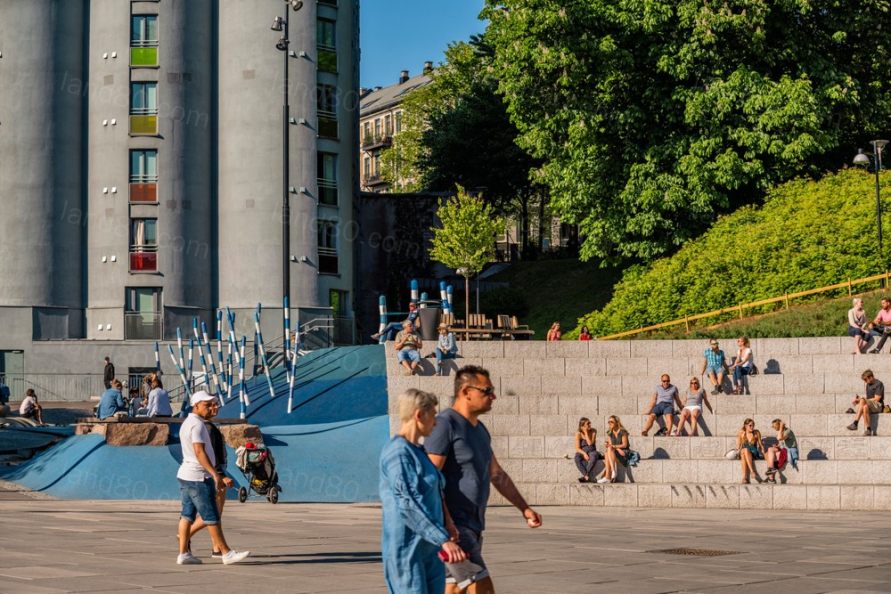| 风格: |
|
| 属性: |
|
| 版权: |
|
| 项目地: |
|
| 设计企业(团队): |
|
| 完成时间: |
|
 组图打开中,请稍候......
Norconsult:内德·福斯(Nedre Foss)在 2008是位于奥斯陆人口稠密的城市环境中的剩余空间。 围绕着这个被遗忘的工业空间,是奥斯陆一些最重要,最具创造力和活力的市区。 看到空间的巨大潜力,市政当局发起了一场竞赛,以振兴这个隐藏的宝石。 Norconsult以“ Flow”概念赢得了2008年的比赛。
Norconsult: Nedre Foss was in 2008 a left-over space, located in the dense urban context of Oslo. Surrounding this forgotten industrial space were some of Oslo`s most vital, creative and vibrant urban districts. Seeing the incredible potential of the space prompted the municipality to launch a competition to revitalize this hidden gem. Norconsult won the competition in 2008 with the concept “Flow”.














History and Present Day
Prior to 1980s, the area was largely industrial, with the Aker River being the center of production and development.
Although the area has since gone through an extensive post-industrial redevelopment, the site at Nedre Foss remained a left-over plot, disconnecting surrounding spaces and hindering the flow of pedestrians.
The concept “Flow” focuses on creating a city park that uses blue / green structures to create sensible and recreational pathways, while also providing a space for play, leisure and connection to the urban nature. The space serves as a walkable connection and possesses an identity that thoroughly contributes to the user’s unique experience, and subtly echoes its history throughout the design.
As far as functionality and purpose are concerned, the transformation of Nedre Foss Park is meant to strengthen the connection of the various districts within the city and to the river. To meet this goal, we identified four main strategies:
1. Firstly, open the existing vegetation. We did this by preserving valuable trees and greenery, while also removing vegetation that blocked important sightlines.
2. Secondly, establish urban and nature connections. In doing so, we cultivated the natural qualities along the river and, at the same time, facilitated better relationships between the urban space and the natural riverscape.
3. Thirdly, we differentiated between the litany of movement patterns throughout the park and thus accounted for various ways users could interact and move throughout the park.
4. As a result, these initiatives created a myriad of positive characteristics: a natural and efficient flow throughout the green areas, pause-and-stay in the open urban park areas, and pause-and-stay along the river in a more intimate space that creates the necessary foundation for an environmental experience.
Design Philosophy
People live and move at various tempos, some slow and pensively, others quick and without restriction. The park design takes this reality into consideration and supports the physical contrasts in the area, along with the differences between the groups of people using it. The design is hard and rough, reflecting the urbanity, while at the same time flexible, with soft and liquid-like lines that reference the riverscape.
Design Through Blue Structures
Water is an important component in the theme of the park – both in the way it is used and treated. For example, the Aker River surrounds the park and winds through it, like veins through the human body, bringing blood to the various organs of our physical being. Similarly, Nedre Foss Park connects the people of Oslo to both the other recreational urban spaces in the city and the Aker River. In certain places of the park, there are steps down to the river, while around the playscapes, the flow of the river rotates a mill wheel and the other mechanisms. By the river bank, there are fish ladders to help the fish cross the steep waterfall. Throughout the rest of the park, rain gardens are arranged to collect storm water.
Short office name: Norconsult
Other designers involved in the design of landscape (architects and landscape architects): Kjetil Espedal, Line Beate Løvlien, Sigrid Urnes, Hilda Øfthus, Jardar Valand, Guro Lehne Lundqvist, Sylvia Piamonte Samuelsen, Hanne Solli
Project location: Grüneløkka, Oslo, Norway
Design year: 2008
Year Built: 2018
Image Credits: Even Bakken, Hilda Øfthus, Line Beate Løvlien, Tomasz Majewski, Kjetil Espedal
|
|